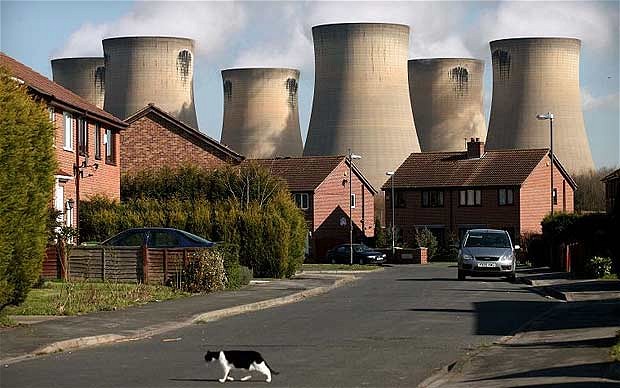The House of Commons Select Committee on Energy & Climate Change recently reported that the Green Deal has so far been a disappointing failure and its effects on reducing carbon emissions has been negligible.
The Green Deal, which got off to a slow start early in 2013 , expects householders to pay for reducing greenhouse gas pollution that comes from generating energy from fossil fuels.
Instead of legislating so that the energy companies have to both clean up their act and pay for the pollution they create from burning fossil fuels to generate electricity, the government’s Green Deal asks the public to pick up the tab and pay for home energy efficiency improvements, which should reduce the energy needed to heat and light the house, and so reduce carbon emissions.
What happened to the principle of “the polluter pays”? Using carbon tax revenues for a national home energy efficiency retrofit programme would honour this principle, and this is what the Energy Bill Revolution campaign proposes.
Passing the costs of reducing pollution onto energy customers seems like adding insult to injury- particularly at a time of growing income inequalities, rising unemployment and precarious employment. Placing the burden on the public rather than on the companies who are responsible for the problem, seems very like the coalition government’s policy of making the public pay for bailing out toxic banks.
Up until the end of 2012, the government required energy companies to subsidise their customers’ energy efficiency improvements with about £2.4 billion a year, through the Carbon Emissions Reduction Target (CERT) programme. About 40% of this was spent on vulnerable householders – around three times the amount that will be spent through the new Energy Company Obligation (ECO). Some of the new ECO will help fuel-poor households to improve their home energy efficiency, via the Affordable Warmth Obligation and the Community Carbon Saving Obligation.
But the ECO is also intended to kick start insulation for solid stone walled homes and homes with alternative cavity walls – so-called hard to treat housing – regardless of household income. This part of the ECO is called the Carbon Saving Obligation and it will reduce the level of help that was available to low income and vulnerable households under the previous CERT scheme.
The Green Deal favours the better off, over lower income households
The Green Deal and the Carbon Saving Obligation element of the Energy Company Obligation (the energy companies’ subsidies for customers’ home energy efficiency improvements) are set to benefit better off households at the expense of lower income households and those in fuel poverty.
According to the Carbon Commentary website,
“The Green Deal and ECO are highly regressive, with the bottom decile, excluding those small numbers who get help from ECO, spending a greater fraction of their cash on energy than if the Green Deal and ECO did not exist. By contrast the top half of the income distribution is expected to see virtually no change. So even under the government’s own figures, ECO is expected to take more from the poor than it gives back in free or subsidised energy efficiency benefits”
In response to a public consultation which raised this and other points (below), the Coalition Government has introduced Carbon Saving Community Obligation Support, which provides ECO subsidies for a range of energy saving measures for households and social landlords in wards with many low income households.
The government’s own advisers and its impact assessment say the Green Deal won’t work
The government’s advisory Climate Change Committee and its own impact assessment predict that the Green Deal and Energy Company Obligation will work less well than the Warm Front and CERT subsidies that they replace, and that this will undermine efforts to reduce carbon emissions and energy use. The Green Deal doesn’t seem to have much going for it, really. Unless you happen to be an energy company, or, given the public private partnership deals that the government is relying on to run the Green Deal, a bank or building company.
The record on previous PPP programmes is that the government has failed to properly monitor them and that through selling-on equity in PPP companies – such as Calderdale Royal Hospital, where the equity has been sold on nine times, with profits which are impossible to find out because the information is judged “commercially sensitive” – banks, building companies and other private companies have made £10bn profits out of what are essentially public services.

